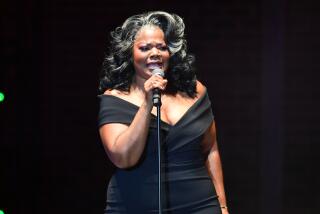Jury Rejects Texas Cattlemen’s Legal Beef With Winfrey
- Share via
CHICAGO — A jury on Thursday cleared talk show host Oprah Winfrey of maligning Texas’ beef industry, rejecting a high-profile lawsuit by cattlemen who claimed they lost more than $11 million after Winfrey questioned the safety of American meat on her popular TV program.
The verdict by the federal jury in Amarillo delighted free speech advocates, who had portrayed the civil case as an important test of “veggie libel laws”--the pro-business statutes enacted by 13 states in recent years to mute criticism of food industry products.
But the constitutionality of Texas’ food disparagement laws remained untested by the trial--an outcome that disappointed activists on both sides.
“My reaction is that free speech not only lives, it rocks,” said Winfrey, grinning as she left the federal courtroom where she sat with a high-priced team of lawyers throughout her monthlong trial.
“However you cut it, the Texas cattlemen have been held to traditional constitutional proofs, and they failed,” said David J. Bederman, an Emory University law professor who tried to overturn Georgia’s food product disparagement law in 1995. “They carefully picked this venue and jury and--even in the heart of Texas beef country--Oprah still whupped them.”
But by targeting Winfrey, the suit gave the angry cattlemen a national forum. Amarillo cattle baron Paul Engler said he would take his fight to a federal appellate court. He claimed he lost $6 million in beef futures during a free-fall on Chicago commodities exchanges after Winfrey voiced fears on an April 1996 show that American cows could be infected by “mad cow disease.”
Engler said he thought he had won his “main objective to convince the U.S. people, the consumers, that U.S. beef is safe. I want to see responsible reporting and responsible talk show hosts.”
Both free speech advocates and supporters of food product disparagement laws said the verdict failed to break ground on the constitutionality of veggie libel statutes. U.S. District Judge Mary Lou Robinson had ruled earlier in the trial that Texas’ veggie libel statute could not be used because cattle were not “perishable” food products and thus not covered by the law.
“We would have preferred a test of the law’s underpinnings,” said Steve Kopperud, senior vice president of American Feed Industry Assn., an Arlington, Va., group that has helped develop veggie libel laws.
“There are still 13 states with veggie libel laws on the books, and they’ll continue to have a chilling effect on free speech,” Bederman said. “We would have liked to see a real decision here.”
Without that test, jurors said Thursday that they were left with traditional questions of libel. In the end, Winfrey’s free speech protections, they said, outweighed any regional sympathy for the cattlemen. “We didn’t necessarily like what we had to do,” said Christy Sams, forewoman of the panel of eight men and four women, “but we had to decide for the 1st Amendment.”
In winning, Winfrey’s costs were enormous. Buoyed by her personal fortune of more than $550 million, Winfrey moved her show and staff from Chicago to Amarillo for a month, taking over a downtown theater, flying in celebrities and even a private chef. She also reportedly spent up to $1 million in her defense, a figure likely to rise as her legal foes appeal.
One of the trial’s side effects was its microscopic depiction of the inner workings of Winfrey’s show--a legal shade-lifting that did not always show her in the kindest light. Producers admitted that statements by meat industry spokesmen were at times hastily edited, and some former show operatives questioned Winfrey’s judgment.
“This is not a newsmagazine,” Winfrey said in her own defense during the trial.
Winfrey was sued for comments she made during a show on meat safety that debated whether American beef could be infected by bovine spongiform encephalopathy, the “mad cow disease” that has infected British cattle herds in recent years and appears to be linked to the fatal disease in nearly two dozen people.
Cattle industry figures purposely chose Texas as the setting for their lawsuit, hoping that Amarillo’s jury pool would look kindly on their claims that Winfrey had disparaged a valuable state product.
Steakhouses and rib joints cluster at every highway exit here.
Thousands of steers are paraded each week before buyers and auctioned off at the city’s Livestock Exchange. Winfrey managed to neutralize the cattlemen’s home advantage by using her celebrity status. Tickets sold out nightly for tapings of her show. Winfrey slyly embraced her new surroundings, sending camera crews around the town. And her every move inside and outside the courthouse was tracked and covered by the local press.
But within minutes of her victory on Thursday, Winfrey made it clear that her heart was not in the heart of Texas. “I’m coming home, Chicago!” she cried.
More to Read
Sign up for Essential California
The most important California stories and recommendations in your inbox every morning.
You may occasionally receive promotional content from the Los Angeles Times.













